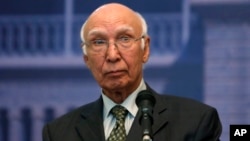Pakistan is accusing the United States of scuttling Islamabad's efforts to facilitate a negotiated end to the conflict in Afghanistan, insisting the slain leader of the Afghan Taliban was not blocking the peace process.
Pakistani foreign policy chief Sartaj Aziz told a news conference in Islamabad Thursday that "all indications" available from Pakistani officials, who he said were in touch with the Taliban, suggested its slain chief, Mullah Akhtar Mansoor, was readying to come to the negotiating table.
Mansoor was traveling in a car back from Iran through the southwestern Pakistani province of Baluchistan on Saturday when missiles fired by U.S. drones killed him and his driver.
WATCH: Video footage of drone srike aftermath
U.S. President Barack Obama confirmed and defended the fatal attack, saying Mansoor had rejected efforts to "seriously engage in pace talks and end the violence" in Afghanistan.
Obama also said he expected the Taliban to continue to carry out attacks following the appointment of a new leader. "In the short-term, we anticipate that the Taliban will continue to pursue an agenda of violence and blowing up innocent people," he said Thursday.
A day earlier, the Taliban formally confirmed the death of Mansoor and announced his replacement, Mawlawi Haibatullah Akhundzada.
Aziz slams US
Aziz said "In less than a year the peace process has been scuttled twice, at that time and right now again."
Islamabad, in its future interactions with Washington, Aziz vowed, will "make them realize that it is not advisable to interrupt the peace process" through such actions and demonstrate "consistency" in the U.S. policy to promote the Afghan peace.
He recalled that Pakistan brokered and hosted the groundbreaking meeting between Taliban and Afghan government negotiators in July 2015.
Aziz said that those talks were "scuttled at a key stage" after the news of the death of Taliban founding leader Mullah Omar was leaked to the media.
Pakistani officials had blamed that disruption on the Afghan intelligence agency.
Aziz also accused Washington of "not respecting" an understanding reached earlier this month in four-way talks on the Afghan peace process that efforts for a politically negotiated settlement will continue because years of use of force has not helped achieve the objective.
"We believe that this (military) approach will further destabilize Afghanistan, which will have negative implications for the region, especially due to the presence of large numbers of terrorist groups in Afghanistan," he said. "This particular incident of Mullah Akthar Mansoor's death in a drone strike on 21 May has added to the complexity of the Afghan conflict."
Drone strike implications
The foreign policy advisor reiterated the U.S. drone action violated Pakistan's sovereignty and breached "the principles of the United Nations charter governing the conduct of states", adding Islamabad has conveyed its concerns to Washington that it would have "serious implications for bilateral ties.
Pakistani authorities are still awaiting DNA test results before releasing Mansoor's body to his relatives for burial, adding the results are expected in the next couple of days.







